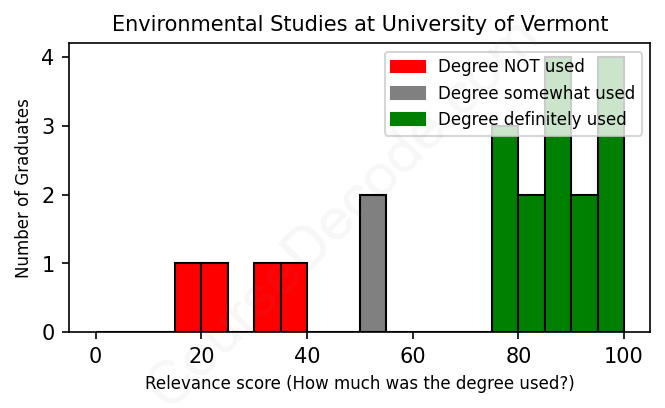
First, some facts. Of the Environmental Studies graduates from University of Vermont we've analyzed , here's how many have used (or NOT used) their degree in their career:

These are estimates based on AI analysis of 21 LinkedIn profiles (see below).
The verdict? Slightly above average. Overall, with an average relevance score of 72%, Environmental Studies graduates from University of Vermont have a slightly higher likelihood (+5%) of finding work in this field compared to the average graduate across all fields:
And for comparison, here's the chart for all profiles we've looked at across all degrees.
Also, after graduating, 57% of these graduates have pursued further education other than another Bachelor's degree (such as a Masters degree or other), compared to the average across all profiles of 35%. This suggests you may need more than just a Bachelors degree to be competitive as a Environmental Studies graduate.
See the details:
|
Relevance score: 50% We think this person has gone into a career only somewhat relevant to their degree. We think this person has gone into a career only somewhat relevant to their degree.
DEGREE INFOGraduated in 2011 from University of Vermont with a Bachelor's of Sience in Environmental Studies. No other secondary education since. JOB HISTORY SINCE GRADUATIONSale Executive Haverford Systems Jun 2011 - Mar 2012 Field Technician  Aquaterra Technologies Inc. Apr 2012 - Dec 2014 Office Assistant  CarrierClass Green Infrastructure Oct 2014 - Feb 2015 Assistant Brewer  Boxcar Brewing Company Feb 2015 - Nov 2015 Assistant Project Scientist  Weston Solutions, Inc. Feb 2016 - Sep 2017 Senior Environmental Scientist  Aquaterra Technologies, Inc. Oct 2017 - Aug 2019 Production Controller  Stowe Cider Sep 2019 - Mar 2021 Production Specialist  Concept2, Inc. Apr 2021 - Present ABOUTNo information provided. |
The top 10 most common jobs done by the graduates we've analyzed (ranked most common to least) are:
When we look at the job paths of graduates from the University of Vermont who studied Environmental Studies, we see a pretty mixed bag of experiences. A significant number of these graduates have found roles that are directly relevant to their degree, especially in positions like Environmental Managers, Water Programs Managers, and various roles in environmental education and conservation. Many have engaged in hands-on work related to sustainable agriculture, ecological restoration, and community advocacy, which is great because it shows they’re actively applying what they learned in school. For example, jobs like the Organic Farmhand, Watercraft Inspector, and Environmental Educator directly connect with their environmental training and show how they’re making a tangible impact in those fields.
However, there are also quite a few graduates who have taken routes that don’t fully utilize their environmental studies education. Positions like carpenters, catering company owners, or roles in customer service tend to lack that direct connection to environmental knowledge. While some might argue that seemingly unrelated jobs can still incorporate aspects of sustainability, they often don't leverage the core skills and knowledge from their Environmental Studies degree on a daily basis. Overall, we can see that while a lot of UVM graduates are putting their environmental education to good use, there’s definitely a number who are in positions that don’t fully utilize their training. This highlights both the versatility of an Environmental Studies degree and the challenges graduates may face in finding roles that keep them centered on their chosen field of study.
Here is a visual representation of the most common words in job titles for Environmental Studies graduates (this is across all Environmental Studies graduates we've analyzed, not just those who went to University of Vermont):

Graduates from the University of Vermont with a degree in Environmental Studies seem to carve out diverse career paths, particularly within the realm of environmental sustainability and education. If you look at their first jobs after graduation, many of them often start in positions that allow them to gain hands-on experience, like internships or roles in organic farming, conservation, or education. For instance, you might find graduates working as farm interns, environmental educators, or even water management specialists. These initial roles set a foundation for them to build more specialized skills and knowledge relevant to their studies.
Fast forward five to ten years, and there's a noticeable trend where many alumni have moved into more impactful positions, such as environmental managers, sustainability coordinators, and even consultants. While not every graduate sticks strictly to environmental roles—some venture into business or unrelated fields—many maintain their ties to sustainability efforts. The broad spectrum of roles indicates that a degree in Environmental Studies can indeed lead to meaningful careers that contribute positively to environmental goals, although some individuals may take longer to find their niche. Overall, it seems that, while not every path is perfectly aligned with their degree right away, a significant number of graduates do find fulfilling careers in environmental work as they progress in their careers.
Honestly, a Bachelor’s degree in Environmental Studies can be a mix of challenging and manageable, but it really depends on your interests and work ethic. At the University of Vermont, you’ll dive into topics like ecology, sustainability, and policy, which can definitely get complex, especially with the scientific and analytical parts. If you’re passionate about the environment and enjoy hands-on learning, you'll probably find it engaging rather than overwhelming. Some students might struggle with the workload or the research components, while others breeze through. Overall, it’s probably around average in terms of difficulty; it's not a walk in the park, but if you're motivated, you can totally handle it!
Most commonly, in the LinkedIn profiles we've looked at, it takes people 4 years to finish a Bachelor degree in Environmental Studies.
So, looking at the career paths of these Environmental Studies grads from UVM, it seems like they’ve had a pretty mixed bag when it comes to earning potential. Some of them, especially those who have moved up to roles like Environmental Manager or Senior Environmental Scientist, are probably making decent money now, especially considering the demand for sustainability experts. However, many started out in lower-paying jobs, like farmhands or seasonal positions, which can definitely put a dent in their early earnings. Overall, it looks like while some have made good strides in their careers and likely improved their income over time, others might still be working their way up the financial ladder, balancing passion for the environment with the reality of making a living.
Here is a visual representation of the most common words seen in the "about" section of LinkedIn profiles who have a Bachelor degree in Environmental Studies (this is across all Environmental Studies graduates we've analyzed, not just those who went to University of Vermont). This may or may not be useful:

Here are all colleges offering a Bachelor degree in Environmental Studies (ordered by the average relevance score of their Environmental Studies graduates, best to worst) where we have analyzed at least 10 of their graduates:
| College | Score | Count |
|---|---|---|
 California State University-Sacramento California State University-Sacramento
|
89 | 10 |
 University of Vermont University of Vermont
|
72 | 21 |
 University of California, Santa Barbara University of California, Santa Barbara
|
69 | 24 |
 University of California, Santa Cruz University of California, Santa Cruz
|
59 | 31 |
 Florida State University Florida State University
|
57 | 10 |
 University of Washington University of Washington
|
57 | 13 |
 UC Santa Barbara UC Santa Barbara
|
57 | 15 |
 University of Oregon University of Oregon
|
56 | 13 |
 University of Colorado Boulder University of Colorado Boulder
|
53 | 24 |